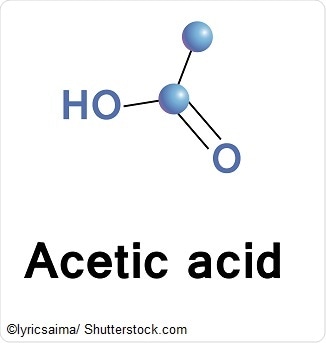
Short-chain fatty acids (SCFAs) are small organic acids with less than six carbons, which are produced by fermentation of unabsorbed and undigested components of food in the large intestine, by the gut microbiota.
The most abundant (making up 90-95 percent) among these are acetic acid, propionic acid, and butyric acid. The three important SCFAs occur in a ratio of 60:20:20 (acetate: propionate: butyrate), with the total concentration decreasing downstream of the proximal colon. Therefore, acetate accounts for over 50 percent of fecal SCFAs.
Most SCFAs come from carbohydrates in dietary fiber. Amino acids resulting from protein digestion are also subject to branched-chain SCFAs, but these comprise only 5 percent of all SCFAs.
Cross-feeding
All the fermentation products in the colon are not SCFAs because many such metabolites are used during bacterial cross-feeding. This phenomenon helps to utilize the substrates that reach the intestine and affects the final pattern of SCFA production.
Some microbes use the end-products of microbial metabolism as their feeding substrate, a process called metabolic cross-feeding. Others, however, use the carbohydrate products that are formed by other bacteria, which are rich sources of energy – called substrate cross-feeding.
Influences which act on the SCFA profile include the diet, colonic motility, and genetic background. The diet has a powerful and rapid effect on the composition and activity of the gut microbiome.
Effects of SCFAs
SCFAs have a pH-lowering effect on the intestinal lumen. This is protective against gut pathogens and enhances the absorption of some types of nutritional factors. Thus bifidobacteria produce acetate which inhibits pathogenic bacteria.
Butyrate, on the other hand, acts as fuel for the colonic enterocytes, as well as preserving mucosal integrity by increased mucus secretion, thus sealing the mucosa against bacterial adhesins and improving the tightness of the epithelial junctions. In this way, SCFAs help to preserve and enhance the function of the intestinal mucosal barrier against the rich bacterial colonization in the terminal ileum and colon.
SCFAs are destined for various metabolic pathways following absorption by the host. Butyrate is broken down within the enterocytes of the colon. Other SCFAs travel via the hepatic vein to be metabolized within the hepatocytes. Propionate is taken up as a substrate for gluconeogenesis, but the remaining butyrate, as well as acetate, become lipid synthesis substrates.
Potential applications
Some workers found that SCFAs seem to have a protective metabolic effect with respect to obesity and insulin insensitivity following ingestion of a high-fat diet because they favor a shift from lipid synthesis to lipid oxidation. The mechanisms underlying these effects are not yet known. However, some SCFAs reduce gut hormone secretion and appetite, as well as acting through the central nervous system to reduce food intake.
SCFAs also seem to play a protective role in colorectal cancer. Butyrate, for instance, has multiple effects such as increasing colonic peristalsis, anti-inflammatory actions, inducing apoptosis, and cell-cycle arrest of tumor cells.
The production of SCFAs is suggested to be the mechanism by which dietary fiber protects against colorectal cancer as well as helping control body weight and its positive effects on glucose metabolism.
- Inflammatory bowel disorders
The anti-inflammatory effect of SCFAs is also of great benefit in preserving mucosal barriers to endotoxin infiltration, reducing the prevalence of non-infectious bowel disorders such as inflammatory bowel disease (IBD), Crohn’s disease, and antibiotic-associated diarrhea. They minimize DNA damage via oxidative groups and free radicals while modulating cytokines that mediate inflammation.
- Effects on carbohydrate and lipid metabolism
SCFAs travel into the host circulation to various organs to be used as substrates or as signaling chemicals. They contribute a tenth of the host’s total energy requirements. Their effect on lipid metabolism promotes a reduction in body weight and free fatty acid levels in the blood. Propionate also inhibits cholesterol synthesis.
The immune benefits of SCFAs include stimulating immune responses and controlling inflammation.
Conclusion
Thus SCFAs are highly valuable waste products of metabolism by the gut microbiome following digestion of food substrates. Their properties and mechanisms of action should be further studied to apply their beneficial effects more widely by proper dietary regulation.
References
- http://www.sciencedirect.com/science/article/pii/S1043661812002071
- https://www.ncbi.nlm.nih.gov/pmc/articles/PMC4303825/
- http://www.pnas.org/content/107/33/14691.full
- https://www.ncbi.nlm.nih.gov/pubmed/16633129
- https://www.ncbi.nlm.nih.gov/pmc/articles/PMC4756104/
Further Reading